
(l-r) Marla Magana Cansino – Belize Network of NGOs; Civil rights attorney, Audrey Matura and Leeroy Banner – Association of Defense Attorneys
by William Ysaguirre (Freelance Writer)
BELIZE CITY, Thurs. July 17, 2025
Defense attorneys, several non-governmental organizations and a couple church leaders were among the many detractors of the 13th Amendment to the Belize Constitution (proposed by the Attorney General, with the support of the Ministries of Public Service, Constitutional & Political Reform and Home Affairs) when the House Committee for Constitution and Foreign Affairs hosted a public consultation at the Swift Hall in the St. Martin De Porres area of Belize City on Wednesday, July 16.

Constitution and Reform committee
Attorney Randall Sheppard of the Attorney General’s ministry explained how the amendment would modify the existing provisions of the Criminal Justice and Crime Control Act, saying that the Governor General would be able to issue the order for a State of Emergency (SOE) for not more than one month, based on the advice of the National Security Council; but the National Assembly can revoke the SOE, and only a special parliamentary majority would be able to vote to extend the SOE period. The proposed amendment would also validate all previous State of Emergencies to protect past legal judgements from being overturned. It would also provide for a Gun and Gang Court to be established with all the powers of the Magistrate’s Court and the High Court.
Previous SOEs have helped reduce gang violence and gang related murders. In the past 4 years, Belize’s murder rate dropped from 125 murders in 2021, to 113 murders in 2022, to 87 in 2023, to 89 last year, cited Assistant Superintendent of Police Stacy Smith. During the 5 months of SOEs in the years 2022 to 2024, the Police seized 2,887 rounds of ammunition and 130 firearms from off the streets, which Smith noted as one reason why the Department finds the SOEs a convenient and much-needed tool in fighting crime.
A State of Emergency allows the Police to cordon off an area for 8 hours each day, during which security forces may execute searches and seize evidence and make arrests upon reasonable suspicion, without a warrant, while issuing receipts for seized items. Female suspects would be safeguarded, so that they may only be searched by female officers.
The Leadership Intervention Unit (LIU), (which replaced the Conscious Youth Development Program – CYDP), has outreached to at-risk youths in areas where SOEs have been implemented, seeking to build peace and understanding between crime victims and perpetrators, as a path to help rehabilitate criminal offenders and to help them reintegrate into society, LIU coordinator Andrew Dawson explained. Through the Community Beautification Program, the LIU has helped 350 young people to earn an income, as the first step to entering the formal workforce. The unit has also trained 30 young men with farming skills in growing greenhouse crops, animal husbandry and honey production.
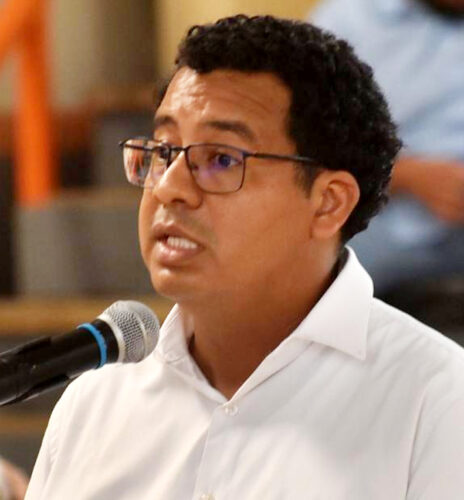
Senator Glenford Dennison
The critics were unimpressed, as they saw it (the 13th) as an unnecessary change to the supreme law of the land, fraught with perils which endanger our cherished freedoms. “Copy and paste”, is how Senator Glenford Dennison disparaged the proposal, saying that much of the new Bill is already the law under the Crime Control and Criminal Justice Act. “These poor people at the Attorney General’s ministry, wasting their time drafting foolishness, copy and pasting. They need to give them a raise … The Police use a baton; do not give them a cannon!”
Civil rights attorney Audrey Matura was scathing in her condemnation: “We must fight this law! This amendment goes contrary to the current Constitutional Committee which should have canvassed this with the people; but instead it’s being done underhandedly. Further, given the state of the imbalance of power, as this PUP administration has no opposition, more than ever it should be better canvassed, and people need to understand the severity of implications.”
“Schedule 5 is a Dean Barrow move to make legal that which was already illegal. This is an abuse of our Constitution,” she affirmed. Belizeans should not be supporting retroactive acts and laws which were already deemed unlawful and which directly affect citizens’ rights, she emphasized.
She gutted the most offensive sections of the Bill, charging that “Section 18A(5) (6) and (7) needs to be clear that it cannot exceed 12 months cumulatively. The government should be required to provide a report, either statistics of the effectiveness of said declarations of special area after 3 consecutive months, and it must present its plans to remedy the problem; or else no further request should be made to the National Assembly. Such plans must state implementation periods, or else the problem would exist forever. Section 18A(8) (9) and (10) is a no-no, as this is too sweeping and gives the security forces unfettered powers, using the Governor General merely as a figurehead, who would sign whatever is placed before her.”
“The continued incarceration of persons without due process cannot continue. This is a knee jerk reaction to the recent cases,” she complained. Section 18A(12) is too open to much abuse, and seems to be a wide net to cast in everyone in the area. It extends the no-warrant issue beyond guns and ammunition, and it lacks checks and balances, she lamented.
“Section 18B is a way to constitutionally entrench unlawful acts of state. No Constitution should be allowed to suspend citizens’ right to address a social problem to which the government offers no solution and is abusing its power. This law allows no remedy for those unjustly caught in this web,” she emphasized. As to 94A, there is really no need to establish a specialized court via the Constitution. The Family Court and a mental health institution would be more preferable choices, as these would offer more solutions to crimes than a gun court.
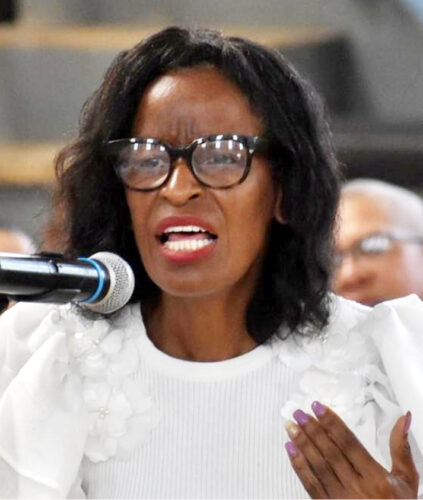
Attorney Sharon Pitts
“What I see, all the features of police state,” warned attorney Sharon Pitts. “We have laws, we have a Constitution, let those things work for the people … The government needs to do the work!” Pitts declared. “Implement solutions,” she suggested, “We do not need the 13th Amendment opening doors to tampering with everyone’s rights; this is not necessary.”
“People can’t trust the Police; that’s not right”, lamented Senator Janelle Chanona, representing civil societies and NGO’s, as she also had misgivings about the accountability of the security forces during an SOE. She cited her female relatives who feel unsafe even in their own homes, because of the current state of crime; but when an SOE is implemented, its powers are so sweeping that even can be detained.
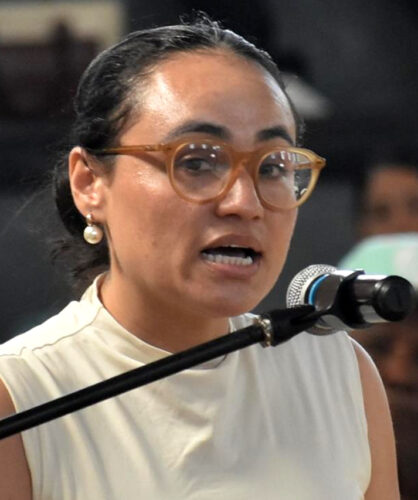
Defense attorney Leslie Mendez
Attorney Leslie Mendez cited the example of a client, a 13-year-old boy who was detained during the last SOE and held for 25 days, without any family visits, with no access to an attorney, all his rights were suspended by the SOE. She could not elaborate more as the case is before the court, but she held the view that we can have crime control without an SOE, and the 13th Amendment is not needed.
“Everyone has rights and dignities,” declared Marla Megaña-Cansino, director of the Belize Network of Non-Governmental Organizations. “The SOE resorts to fear for control, but such repression leads to resentment, which would lead to retaliation and more violence” she warned.
More can be accomplished by social programs and community outreach than by heavy-handed police crackdowns, proposed Maryln Ordonez of the Association of Beneficiaries of Retired Public Officers. She harked back to the halcyon days of her youth in British Honduras of the 1970’s when she blithely walked the streets without fear, basking in the freedom of her home neighborhood from Berkeley Street to Raccoon Street. There were truancy officers to ensure that any young person or child found on the street during school hours would be investigated, and social workers would intervene to get that child back into school. This support network ensured that all got the education to uplift themselves beyond their impoverished circumstances, even the children of working mothers got help, she recalled. She offered these suggestions for solutions to the crime problem, rather than enforcement with more police boots on the streets.
“The 13th amendment takes away rights”, criticized Leeroy Banner of the Association of Defense Attorneys. He cited the lack of trust the general citizenry feels for the Police, noting that the Police have been known to fabricate or suppress evidence, and there have been many recent cases of suspects and detainees dying in Police custody, of even women being raped while in Police custody. “This inspires no trust that the Police will do the right thing,” when given the powers under the amendment, Banner argued. There were 605 persons detained in the past 9 State of Emergencies, but only one tribunal was held, and no one was charged, he noted, concluding that the SOEs do not work.
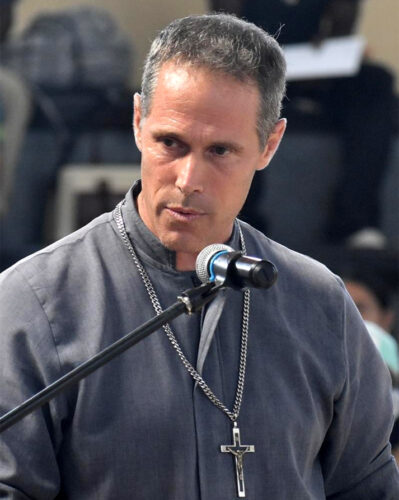
Fr Scott Giuliani – Our Lady of Divine Mercy parish
Educator Sylvia Marin of the Belize National Teachers Union presented the BNTU’s position, that education and social programmes to help at risk youths, low income families and children from single parent homes would be a much better solution to crime, than draconian changes to the law, which could rob ordinary citizens of their rights.
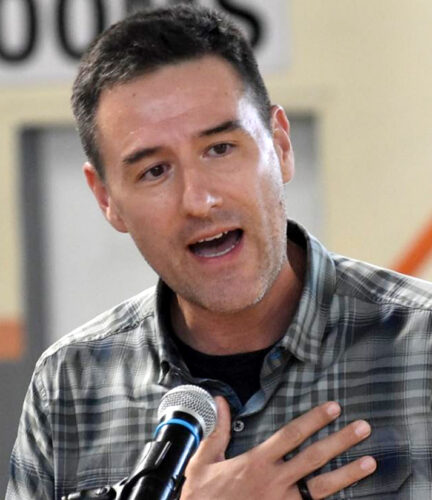
Fr Andres Vall-Serra S.J.
St. Martin De Porres’ pastor Andres Vall-Serra S.J. and Father Scott Giuliani of Our Lady of Divine Mercy Parish also felt that the amendment was not in Belizeans’ best interest, that society needs to be charitable and compassionate to its less fortunate citizens, and the amendment seems to be changing the legal presumption of innocence until proven guilty, to the attitude that suspects are guilty until proven innocent.
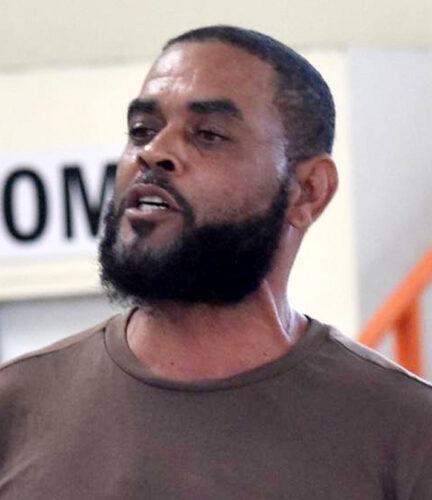
Kenneth Big Tom Flowers
“I am a victim towards it. I am a person that has spent a lot of States of Emergencies in jail for just being on the streets,” said Kenneth “Big Tom” Flowers. “I didn’t commit a crime. I used to do drugs, so I used to get picked up a lot. But at the end of the day, I was just fighting my own self, going through my own problems. But I got victimized by my past, so that kept me going to jail whenever they have States of Emergencies, when I didn’t even commit a crime! So now I am against it, because a lot of children who are not involved in crime will be in jail,” he concluded.
“You have people who are fully against the bill, who reject the bill in its entirety. And there are others who say, ‘listen, we have recommendations, we have submissions to make the bill better, to make it more effective’. So, it’s a combination of both,” cited Foreign Minister Hon Francis Fonseca, who chairs the House Committee for Constitution and Foreign Affairs. “We’re taking careful, copious notes of everything that is recorded. We have to report to the House Committee. Of course, we have as well … have to report back to our Cabinet on the status of the bill.”
Former PUP senator Collet Montejo and Fort George resident Amalia Castillo JP spoke out in support of the Amendment, citing the peace of mind they felt during the SOE, in “knowing that violent gang members are behind bars”.
Minister of Public Service, Constitutional & Political Reform, Hon. Henry Charles Usher wrapped up the day’s proceedings, saying that all comments, opinions and statements verbal or written would be recorded and reported to the Cabinet for further consideration of the Bill. Another public consultation is planned, possibly in the Cayo District, and that will be it; there won’t be nationwide consultations, he indicated. Members of the public are invited to submit their statements in writing, by hard copy or by email to the Committee.
British Caribbean News


